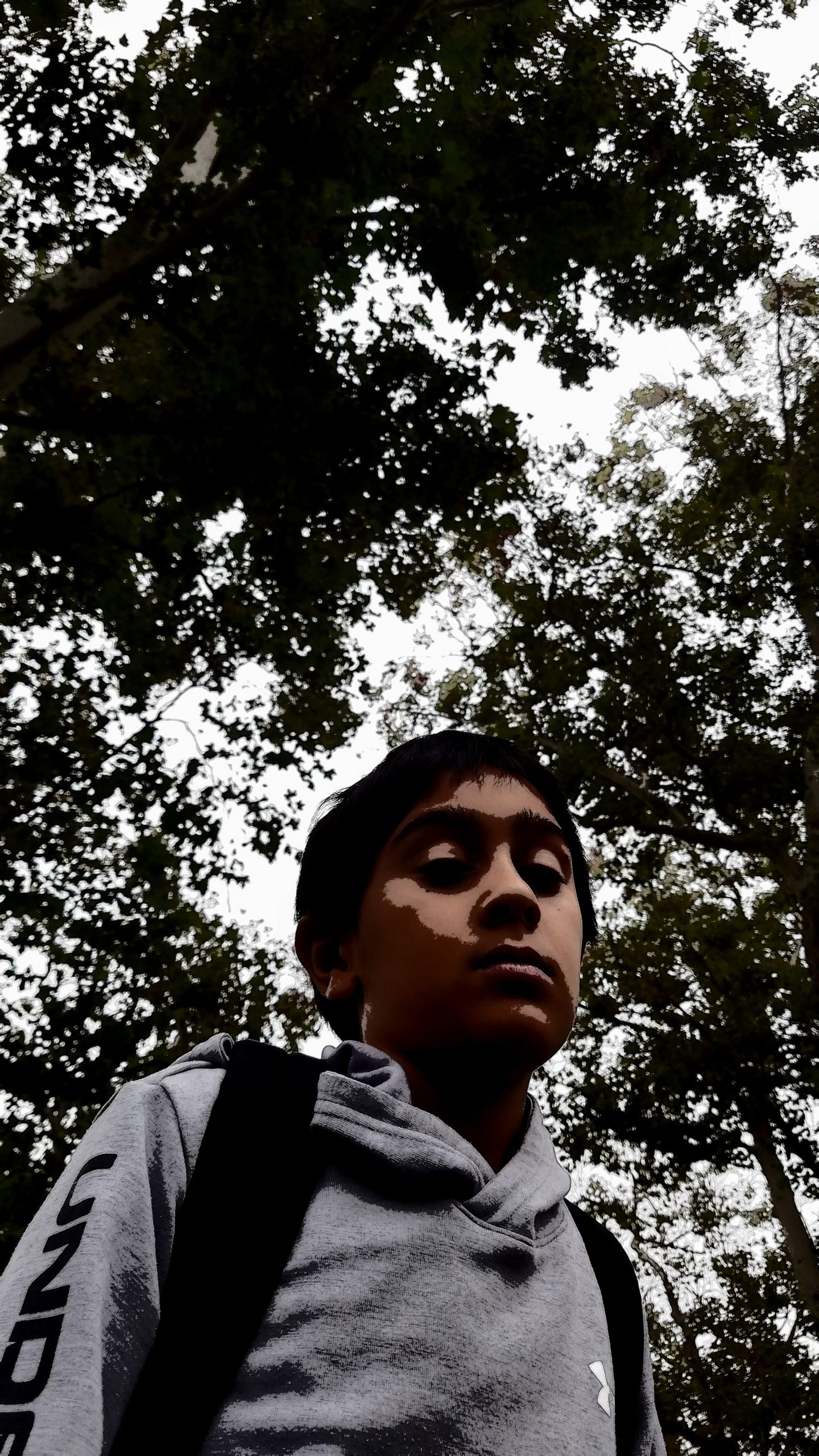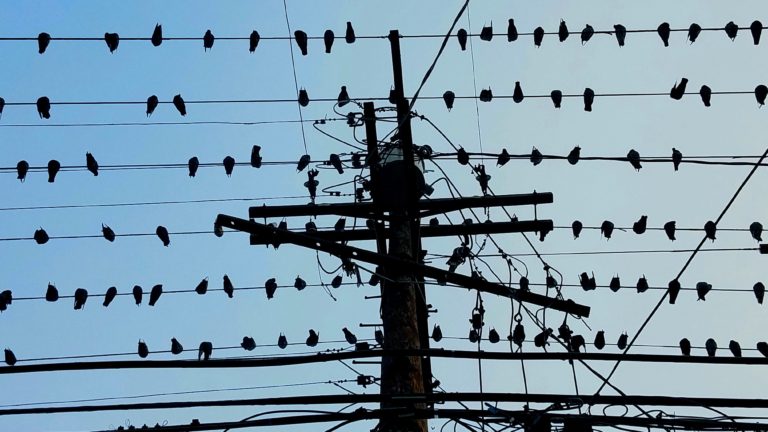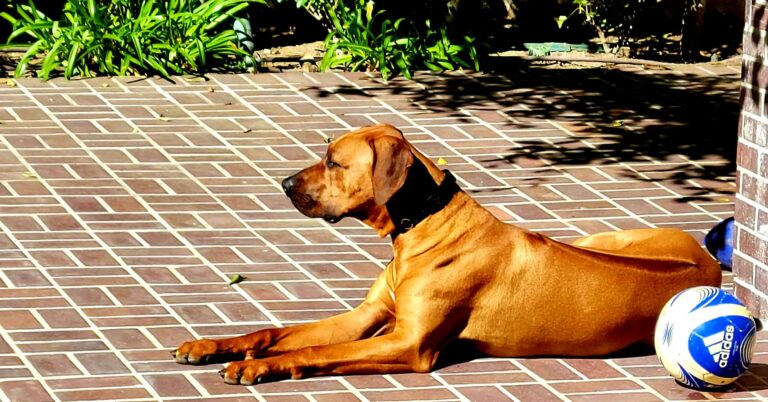Mike Dwyer – Fiction

June, Jordi, & The Hope
Three hours gone from North Platte, cornfields give way to Lincoln. At first miragelike in the heat, The Capitol’s shimmering tower takes full imposing form and seems to pull June’s truck faster towards the city. She’s surprised by sudden goose pimples, quickened breathing; a rare smile softens her face. June will for the first time see The Hope in person, hear him deliver a surprise historical announcement. Excitement seems fitting.
She is only thirty-one but features coarsened since childhood add false years. Her jet-black hair is short on top, the sides shorter still save for a thin, waxed strand edging each ear. Her breasts are bound flat beneath an untucked black work shirt, the back of which sports “The Hope” in royal blue beneath a silkscreened photo of the man himself. Long sleeves and loose gray jeans cover June’s limbs, wiry strong from years of running trails, cleaning rooms, chopping food. Well-worn crimson Doc Martens anchor her.
She steers her aged pickup to the stadium, but “Lots Full” signs divert her across the tracks. Wedging into a no-charge spot in someone’s front yard goes easy enough. Two hours before a weekday event announced only three days prior, the streets and small lawns teem with amped-up supporters of The Hope. There from widespread starting points and linked by like-mindedness, strangers meet, unite, share food and drink. A big buzzing tailgate party, minus any game.
June skirts the throng and strides off alone towards downtown and Capitol Park. She’ll circle back as The Hope’s arrival draws closer. Ten times bigger than North Platte, Lincoln is not a place where June could live – too quick a pulse, too big a bustle – but two prior visits did bring semi-startled enjoyment. Despite all the traffic and people, and the few high-rises blocking a blue sky, a sense of calm order radiates out to her as she rounds each tidy corner to find bright storefronts, buoyant sidewalk cafes.
Some of the Lincolnites June passes send her a smile. No smile back, but she’s appreciative. Thousands of them surely back The Hope, and though their smaller city is not rich and storied like New York, Chicago, San Francisco, she expects it puts those bloated messes to shame. Some edgy Lincoln attractions might spark discomfort in certain folks, but June is not some close-minded hick. The fact that she has lived nowhere but North Platte might bring some to label her as such but let them. She knows that the America envisioned by The Hope draws its breath and blood from small towns like hers. Even from some cities, like this one.
“Law and order from chaos, simplicity from confusion. Lasting values from rampant permissiveness. Pride and prosperity from disillusion. The President’s inspiring hope for these things showed itself real during his first term. When these dark four years soon end, he will regain what was stolen. A cleansing national resurgence will be back on track. Hope will shine again, and this time greatness will take full root, then blossom.”
After June recently read that, ‘The Hope’ became her own title for him, and she silkscreened it onto her shirt. Sporting it around town, some positive reactions have come but she hasn’t yet heard or seen anyone else use it. No worries. For her, it fits his purpose here, now. He himself might be rife with flaws, but it’s all about the vital hope he spreads to so many. To June.
Fifty-five minutes before the big event, June arrives at the stadium and joins the entry queue. Thousands are already inside. Some in line shout their guesses as to The Hope’s mystery announcement. “He’s gonna name Rikki as running mate!” “Nah, it’ll be Vikesh!” “Slam-dunk evidence of The Steal!” “The Storm, it starts today!” June doesn’t know about all that, but these days she feels stronger, calmer, expectant – she credits The Hope for that.
As she slowly progresses in the pat-down line, some protestors off to June’s right get her attention. Most of them silently loft their signs – “A Lying Danger to Democracy,” “Lock him up!” “A Pig’s Pig,” “Liar, Loser, Crook” – while a few yell what is on theirs. Two men in line just ahead of June bellow back in unison to the yellers, “Woke-ass shitbirds!”
June avoids such huff and puff conflict. She starts to look groundward but notices a woman near the protest group. Similar age, tall and fit like June. Short thick red hair, eyes of sun-splashed aquamarine. Her shirt reads, “Badass Women Trucking Company, Cheyenne WY,” and its colors are the same black and royal blue as June’s. The woman sees June and beams to her a sunburst smile so warm and inviting, June wishes she could put it on and wear it.
June’s breath catches and she diverts her eyes down. But it’s too late. She looks back at the smiling woman and, determined, holds her gaze. Stimulation, excitation, unease, fear. All four pull at June in a two on two tug o’ war. The last two win. June spots a row of port-a-potties near the stadium’s south wall and flees there. Good idea, anyway, to piss before heading in.
Sitting on the toilet, she takes calming breaths and mentally shakes away the woman’s face.
She wrestles her mind back to the matter at hand, pictures The Hope on stage – making history, bringing clarity. In minutes, she’ll be inside to witness it. Soon enough, she feels better, safer. She finishes up and steps out. The woman is standing right there, waiting for her. Smiling.
“No, I don’t have to pee. Had no idea I was a stalker!” She gives a relaxed chuckle.
“Uh, what do you want?” Not exactly what June is thinking but it’s what comes out.
“To go in with you maybe? Didn’t know about this till an hour ago. I’m visiting from Cheyenne, walked over from my sister’s condo just down the way. Thought I’d sneak a peek at the general madness out here, then go eat. But I saw YOU, in THAT line, alone. You’ll get targeted in there, ya know. Safer if it’s two of us, yeah? I’m game if you are.”
A moment of confusion, then June understands. “You think I’m going inside to protest?”
She turns around, shows the back of her shirt. The woman’s smile disappears. Her reaction is, in order, confusion, concern, and soft amusement at her own mistake. The smile returns. “Ooops! ‘The Hope,’ hmm, haven’t heard that one.” She points to the swarms of people waiting to get in. “You have to admit, you don’t very much look like one of them.”
“I’m not one of anybody,” asserts June. “Not part of any party. I’m a free independent person.”
“FIP, for short! Me too, I like to think. Okay then.” Another perfect smile. “I’m Nel.”
June looks at Nel, then away, then back. “I’m June.” She balks for an instant, then stuns herself as she adds, “But I’ve never felt like a ‘June.’ That’s not me.”
“Okay. Who are you then, when you think of yourself?”
She looks down, then up and right at Nel. “Jordi. I’m Jordi.” First time ever saying it out loud.
“Jordi, yes. It fits you. But do you fit this crowd? The photo on your shirt, that fits them, but does the rest of you, really? You’re a puzzle, Jordi! So then, your preferred pronouns?”
Jordi stiffens with fear. She has rashly leaped from a cliff only to be suspended, floating halfway down. Or halfway back up. “I’m just me.”
Nel persists. “When people refer to you, should they use her, she? He, him? They, them?”
“I’d prefer they didn’t refer to me at all.”
Nel grins at that, says, “But if they did?”
Jordi swallows twice, finishes the leap. “He.”
“Okay!” Nel points to a low wall beyond the toilets. “Ya wanna maybe sit down before you go into this thing? Plenty of time, I think, before it starts, and I would love for you to talk to me.”
“I don’t discuss politics,” Jordi tells her. “With anyone.”
“Politics shmolitics. I’d just like to know more about your FIP self. Anything. I’m curious!” A hopeful raised eyebrows look from Nel, then Jordi is almost unbelieving of his own movements as he walks with this woman to the wall and sits. He lays down his armor for the second time ever, and he talks. He’s astounded to hear what comes out. Initially emerging chopped and chunky as from a frozen river, his words loosen into a stream. His delivery is semi-monotone, with bubbles of raw feeling popping up here and there, then vanishing.
Jordi realizes he is speaking, knows full well what he is saying, but he is also listening – an interested witness. As is this red-haired woman beside him who says nothing and with calm care takes it all in.
He begins it at age four or so. Sometimes brought by his mother to a beat-up motel room/meth den on North Platte’s outskirts, or more often left alone in their two-room fleabag. Mom would return that day or the next – pale, spent. She’d pass out but later rise, dance him around, laugh, call herself “Your Drunky Drunk, Methy Mess Mommy!” Then she’d lift him, call him “My Perfect Big Girl,” or “Little Miss Tomboy,” or “Fucking Pain In My Ass Mistake.” It fluctuated.
Jordi entered the first of seven foster homes when he was six, a year before his mother OD’d. The second one was tolerable, as was number five, but both were shorter stints. In number four at age ten, the mom beat him, and her husband went with molestation. Grubby, piercing fingers inside Jordi, ejaculate soaking his chest. The man said he was doing a young boyish freak a favor, reminding her she was a girl. Jordi said nothing, forgot nothing. The couple’s daughter and son, 11 and 12, gleefully practiced the same pure viciousness as mom and dad.
North Platte Middle School was much the same. Jordi was marked as lesser, different. He was June The Goon, Mutant Girl, Little Orphan HeShe. The teachers and staff usually looked away from the hazing and humiliation, called it kids being kids. Daily events included being spat on, having pants yanked to his ankles, getting grabbed and held down as makeup got smeared across his face. Ankle-trips, back-of-the-head slaps, shirt-rips. The two times he attempted a mumbled complaint, Jordi was asked what part he had played in bringing on the attention.
His regular running away, hunting for scraps behind North Platte Pizza, sleeping in the trees by the bridge underpass, avoiding the cops and CPS the best he could – he had to do it. To get Jordi the hell out of NPMS on schedule, several of his transcript grades were falsely boosted by a weak but well-meaning counselor. No more middle school, or foster homes.
At 14, Jordi began his years at Boys and Girls Home Nebraska on 2nd Street. BGHN had its pitfalls and perils, especially early on, but ultimately suited him better than past setups. His quiet, hard-working ways eventually earned a begrudged respect, or at least a passing truce, with most of the forty other BGHN wards of the state. After he’d return from shifts at the diner, his nights were mostly without incident. One girl even developed a deep crush on Jordi, still ‘June’ to her, and proclaimed it in person. He avoided her after that, but here and there they would pass each other, and he would inaudibly whisper to her, eyes down, “I’m sorry.”
Daytime, he was at NPHS. Not a meat-grinder like middle school. Often ignored, rarely harassed. A few fellow outsiders showed him kindness and would’ve been his first friends if he had let them. They directed him to adult allies – one teacher, one counselor. Decent adults who couldn’t quite get Jordi to the endline. He had worked two jobs since 14 and put both far above school. At 18, he dropped out of NPHS and left BGHN for a tattered, glorious studio apartment.
After that, it was work, always work, getting Jordi through. It was gratifying, cleansing, and it filled up weeks that badly needed filling. He cleaned rooms at Travelodge on weekdays and did Thursday thru Saturday nights at the motel’s restaurant, Penny’s Diner. The dual gig had been thirty hours a week in high school; after, it went to fifty, then sixty. Jordi was tireless and exact, hands down the best employee at both sites. The morning shift’s Head Maid by nineteen, he ascended from dishwasher to busser to prep cook to line cook at Penny’s by twenty.
He added running, four times a week with an extra-long one on his Sundays off. He’d do the trails at Buffalo Bill, Lake Maloney, Lake McConaughy. No booze or drugs for Jordi, so all the work and running made his body, such as it was, fit and hard. Jordi’s studio gave way to a two-bedroom rented cottage with a small backyard. It was all his, and he made it pristine and handsome. No dust, no clutter, no cuteness.
The cottage, the work, the running, sometimes they were enough to overtake Jordi’s loneliness. But his always-simmering fear, frustration, anger, no. He needed something more and five years past NPHS and GBHN, something more came. A co-worker repeatedly invited Jordi to his church. North Platte was crawling with churches, but Jordi had never entered one. After two months of no thank-yous, he relented.
In just six months at Rock Bible, parts of his past settled calmly into the rear-view, and he dropped his guard enough to allow in fellowship, community, light. The open and affable congregants, the ever-present rock and pop music, the fund-raising suppers, the community cleanups and lively service trips to soup kitchens and shelters – all of it fueled in Jordi a heady move towards palpable contentment, a less harried ease. Happiness too, maybe, one day.
Clearing the way was Pastor Kevin. Patient, kind, knowing, Kevin projected spiritual gravity and firm leadership but also made himself a ready friend. He cracked funny, mostly self-deprecating jokes at the perfect times. Jordi eventually laughed aloud at one of them, surprising and delighting the other congregants. Himself, too.
One Sunday night, the two of them were working in the church’s pantry readying a food giveaway. Jordi hadn’t exactly planned it but the setting seemed right; he unburdened himself to his Pastor. His secret name remained so, but he unveiled much: that he had never felt female, that he had from a young age shown people his true outer self and didn’t stop despite the torment and abuse. His co-workers, the only people he spent any real time around, got used to his being different and came to accept him. Tolerate him, at least. That ease and confidence with his outer self was vital, he confided to Kevin, and a point of hard-won pride.
Jordi’s inner self, though – a much tougher nut to crack. He shared that he had long been attracted in every way to females but had never acted on it. He made it clear, though, that he did not find his desires wrong or sinful. His choice of celibacy sprung from a certainty that any attempt at a relationship, even a traditionally accepted one, would trigger an always-looming, paralyzing tumult. He had never loved anyone and didn’t know how to. Loving a woman, then, and doing it in his small town, with his zero experience and ever-present demons apt to strike – it would only bring on the tumult that much faster.
But now at 23, his resolve to stay solo decidedly weakened, Jordi had sought Kevin’s ear and counsel. Not as a pastor, if possible, but simply as a wise and older friend. Jordi’s story done, Pastor Kevin responded. He put both hands on Jordi’s bound breasts, squeezed them, and said, “Your womanly soul as created by God, it’s there inside you, June. I can help you find it, with His grace. You can know peace and true purpose in His light, amen. Let’s go lay down now.”
Jordi stood stunned as those words were uttered, but when they stopped, he removed Kevin’s hands and walked out of the church. He was not crushed. Worse attacks had assailed him, and a life of work he did well, a simple healthy life with occasional quiet pleasures, it already existed. He had built that life for himself and hoped once again that he could make it be enough. For the next six years, it sometimes was.
“I found The Hope then, two years ago,” Jordi tells Nel. “I’d never bothered with news, politics, and didn’t know much about him. A left-behind newspaper, The Epoch Times, was in a room I was cleaning and it was open to a story on him. His life-long sobriety, his love of neatness, order, strength. His road through college and business, right to the top, then putting his people and country to the center. And for all that, he gets cheated out of a second term. He’s been lied about, ridiculed, attacked, arrested. I know those first three in my bones.” Jordi pauses, blinks, looks squarely at Nel.
“I woke up today knowing I’d be here, but I had no clue I’d be telling some stranger all of this. Telling her my real name. Life can surprise you, I guess. Maybe that’s good.” His face almost forms a smile. “So, a big, clichéd soap opera, huh? Probably bored you to tears.” He doesn’t really think it was and dearly hopes it didn’t.
Nel leans close. She places her hand very lightly upon Jordi’s cheek, then moves it to his shoulder. “Wanna go get some food, a coffee, something? I know a quiet spot nearby. Maybe you’re not finished telling it, and I’d like to hear more if you’re willing. Or we can talk about something else entirely. Whaddya say?”
Jordi hesitates. “You mean after The Hope is done and I come back out?”
Nel hesitates too. “You’re still going in there?”
A tightening of Jordi’s jaw. “What? Yes! This man will defeat the chaos!”
Nel says, “I’m sorry, guess I misunderstood. Don’t get mad at me!” That smile comes, her first since Jordi began. “Do you have a cell phone on you?” Jordi says no. “Wait a second, okay?” She pulls a worn bag off her shoulder, looks in and rummages, comes out with a pen and scrap of paper, and writes. “Here’s my number, and my sister’s address. I’m here for two more days. We could go someplace when you’re done here. And if not today, another. My regular haul route is Denver, KC, Omaha, Lincoln, then back to Cheyenne. Cheyenne is the same distance from North Platte as this place.”
She smiles again, adds, “That final leg home, I go right through North Platte. I’ve eaten in Penny’s Diner before, multiple times! You were right back there in the kitchen, who knew?!” Nel winks at him, and Jordi attempts humor: “Who winks anymore?” Nel laughs, puts the pen in the bag and the bag back on her shoulder.
“If we don’t meet again today or any day, I wish you peace, Jordi, and I hope you find real happiness. Real love.” Nel tucks the paper scrap into the left front pocket of Jordi’s shirt, then places her hands on his shoulders. “Peace, dude!” She smiles, turns, and walks away. Jordi remains there for a minute, maybe more, watching her leave before he gets back in line.
His timing is good. Not ten minutes after entering and threading his way well up towards the stage, it’s time. Loud music plays, he doesn’t know what, and there before him is the man all are here for. The crowd’s booming roar brings a power that physically shakes Jordi. The Hope waves to those sitting in the east stands, pivots to the west-siders, and gives a last wave up the middle to those, like Jordi, who have chosen to stand. The last-minute arrangements have skipped a working jumbotron screen, but Jordi is close enough to see that The Hope is not smiling. The crowd slowly calms, then he speaks.
“Hello, Americans.” His tone is quiet, somber. “I do this not on live television or online, but in person. My face to yours.” The stadium crowd, waving and shaking the latest in patriotically colored merch, raises up more thunderous noise. The Hope is used to such a scene; he waits for the commotion to quiet itself. Jordi stays still, alert. The Hope continues.
“I am here to tell you that I am no longer running for a second term.” The crowd is momentarily stunned silent – then they erupt. So many people yell the same one word in unison that it becomes a howling, echoed dirge: “Noooooooo, nooooooo!” Before it subsides, the man starts speaking again. Many furiously shush those around them, though they’re not sure they want to hear anymore. Here it comes.
“There was no steal, I lost. The charges against me aren’t a witch hunt, they’re true. The civil trial’s guilty verdict, it was a just one. There is no Storm that I know of. My attacks and allegations against my opponents and critics have almost always been false. And selfish.” Panicked screams pierce the sticky air, but some onlookers, Jordi included, stay silent.
The man adds more. “For a very long time, I’ve pretty much been what many claim: Liar. Crook. Narcissist. Coward. Predator. Egotist. Baby. Loser.” Each label brings louder cries, frightened gasps. By the last one, tortured moans rumble through the cavernous venue. The man raises his voice to be heard over them.
“I came here to tell you these truths and say I am sorry. Not fully sorry, not yet, but it’s a start. Tomorrow, I’ll continue on this road to forgiveness, and to consequences. I won’t finish that road, but I do hope to be a better human being before I die. Goodbye.” He leaves the stage.
Jordi scans the crowd. Some stare at nothing, some weep. Some seem ready to rush the stage, tear down the stadium, both. Others, though, quickly conjure up explanations and proclaim them with an insider’s brashness. His youngest son has been kidnapped; he had to say that shit to get him back. It’s a pre-planned diversion as he starts The Storm. He is about to die and wants a worthy successor to save the country, to save it without the great man’s shadow still looming.
That last theory is latched onto by many; it gains steam and volume as it spreads. A man then comes from stage left and steps up to the mic. It’s Vikesh Ramasutra. The crowd hushes, then Ramasutra says the great man is still great but cannot stay in the race. He says the great man told those lies to help and protect them all. He hints that the new, spreading theory, the favorite, is true. He will pick up the other man’s banner and carry on. He makes the same proclamations and promises the other man has made. The crowd appears slightly less stricken. Some even buck up, shout their approval, spot the TV cameras, and go wild for Ramasutra.
No matter. Jordi is already moving through the parking lot, his gait fluid and purposeful as he reaches into his shirt’s left front pocket.



